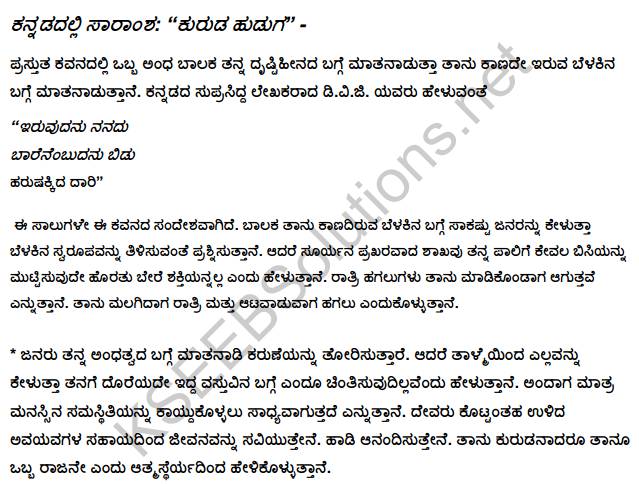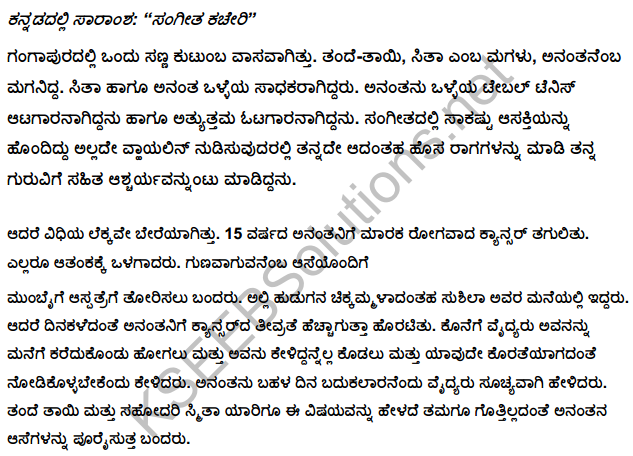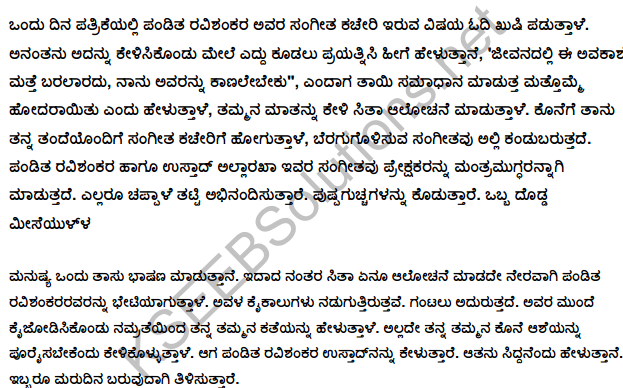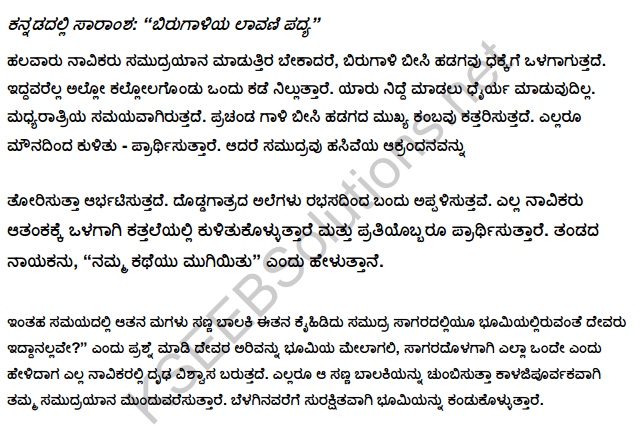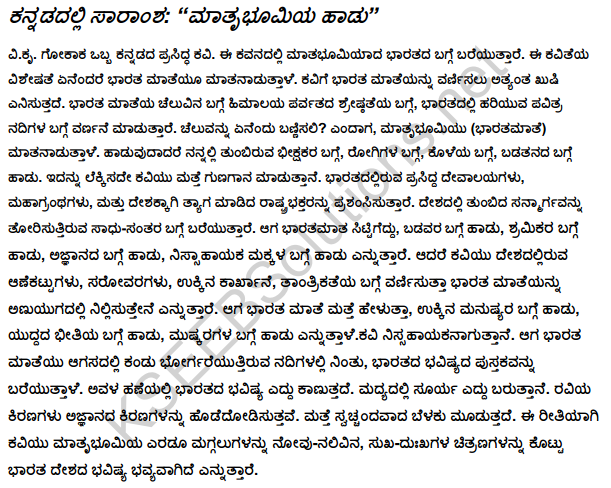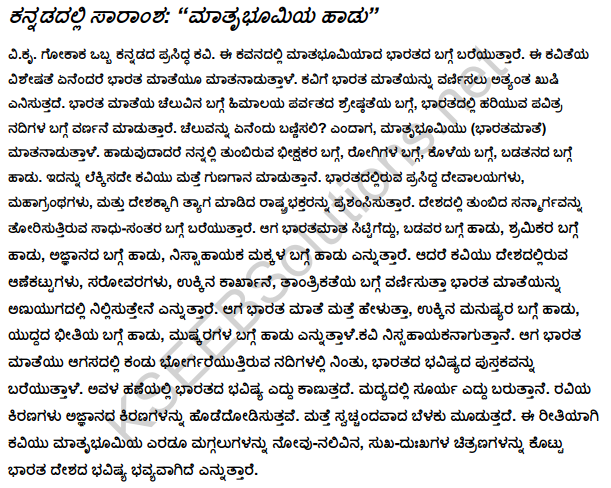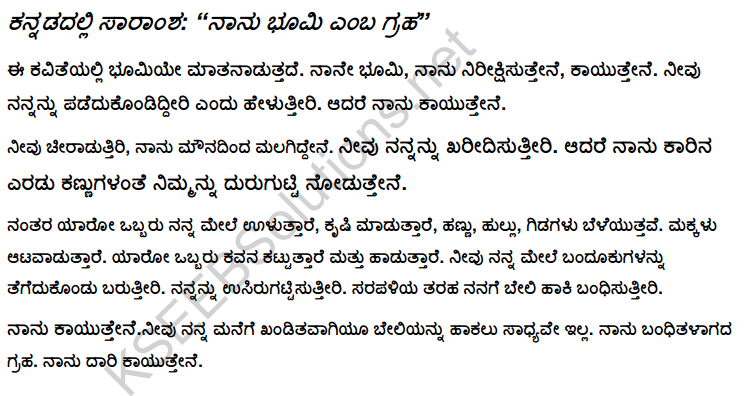10th English The Discovery Lesson Summary in English and Kannada
The Discovery Lesson Summary in English
Hermon Ould’s play “The Discovery” dramatizes the events on the last night of Christopher Columbus’ sailing expedition to search for a sea-route to India. The story is sometimes anachronistic and credits to Columbus for greater knowledge than he had on the expedition that led to the ‘chance’ discovery of America.
The crew is restless at the outset and becomes eager for a fight as the play unfolds. The high handed attitude of Columbus and absence of sympathy for the justified complaints of the crew leads to a situation to mutiny. Destiny, however has decided to bring laurels to Columbus and crown his efforts with the discovery of a land that is still not colonized.
![]()
Columbus is quite authoritative and stern disciplinarian. Yet he seeks adventure, he is risk-taker by nature. The play conveys both the strengths and flaws I in the character of this great explorer. Santa Maria is the name of the ship in which Columbus and his men sailed on their voyage of discovery of the New World beyond the seas.
In the opening we notice Juan saying that the captain Columbus becomes angry whenever he heard the song of seamen but Diego opined that whether he had not the liberty to sing to keep up their I spirits. The conversation of other semen reveals that they are not happy to follow the captain. Then comes captain Columbus. He says Diego to correct the candle of on the foremast and to take his position at the quarter deck, because a man should know his place. The seamen | again sings and pedro tries to defend the drunken seamen. He blames and says his tongue is his worst enemy because he is always furious.
Then enters one of his servants called Pepe. He says that he always prefers his company. He further tells him that he doesn’t speak to the seamen. Then he says that he doesn’t doubt anybody. Columbus says to Pepe that he is young enough to have faith. Then , Pepe says that Seamen are horrible and sometimes desperate, but the song of the seamen turns into discontent. Their noise grow louder.
![]()
Pedro comes to Columbus and says that the seamen do not pay any attention to his order. Columbus becomes furious. ( He finds somebody crawling about the deck and calls him but Pepe replies that . they shall not. He says that the seamen are of the opinion that “The Santa Maria” (the Ship) will be the lighter for his carcass! Another crew Francisco begs excuse. Columbus talks about disciple and says that it has no buts and bids. Don Pedro to call Guillermo Ires, who knows better what it is like in irons. Pedro observes Guillermo Ires and other seamen rushing in angry mass
towards the captain growling like angry animals. Columbus warns that the first man who comes before him spend the rest of the night in irons. Nobody moves, except Guillermo. Columbus says that if nobody works, he will perform it himself.
Guillermo expresses his disappointment and says that they all want to go home and Columbus had made them sheep. He further tells him that they will blow their way back home. Columbus appeals for silence. He praises Guillermo as an excellent sailor and an able-bodied seaman. He further told him to obey him as he is his captain. He sends him to his duties. The tone of authority calms all men. Later they make noise. They blame Columbus. They are about to stampede up the poop going way. Pepe spreads his arm out and prevents them from doing so and calls them cowards. But they blame Pepe as dog.
![]()
At this juncture Columbus goes for a speech. He makes clear his vision but he has discovered that Loyalty passes like seaweed, Friendship breaks as a mast hollowed by worms breaks, and Discipline, duty and honourable obedience are bubbles that burst at the first contact but Pepe says that he is loyal and obedient. Pedro also says about his loyalty.
Then Columbus looks out at sea with fixed attention. He peers more earnestly into darkness. Here Juan says that they are all simple men. Guillermo doesn’t want to wait. Here Columbus remarks that simple men shall not judge their betters and dark deeds are better done in the dark. Francisco says that desperate men do not always act upto the best that is in them.
Columbus doesn’t speak anything and then speaks to Don Pedro that he saw some faintly flickering light rising up and down. He drew their attention. Pedro is delighted. He said, ‘Glory be to God’ Blessed Mother of God. The voices proclaimed. A light, land’ Columbus ordered them to stop. The conflict is resolved.
![]()
The Discovery Lesson Summary in Kannada
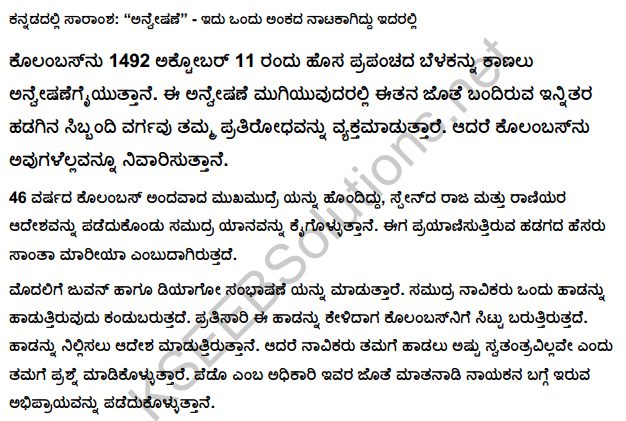
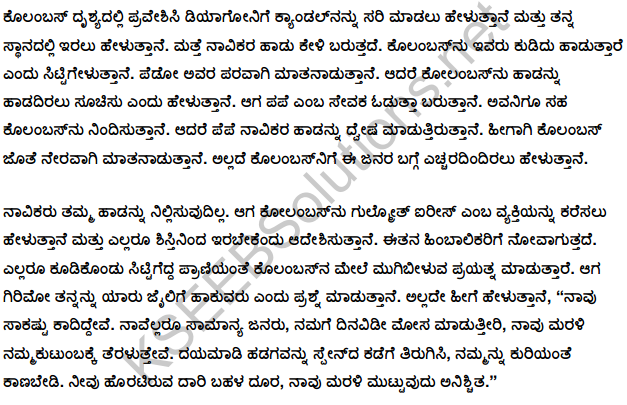
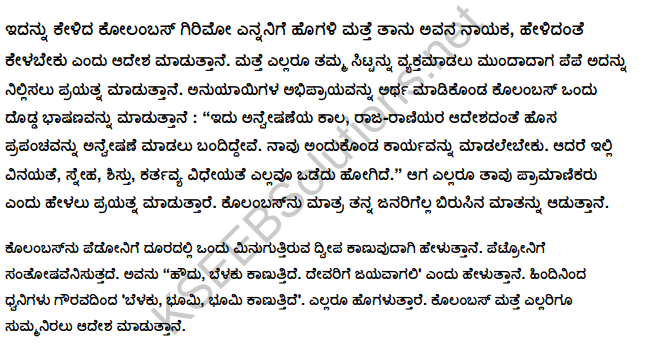
![]()
The Discovery Lesson About the Author
Hermon Ould (1886 – 1951 A.D) is a well known author. Some of the published works of Hermon Ould include Cindrella; a Play in four scenes (Baker’s royalty plays); Dick Whitrtington and his Cat : A play in four scenes (New plays from old stories, 2nd series); Ali Baba and his son Hadji; A play in four scenes. (French’s plays for juvenile performers).
![]()
The Discovery Lesson Word Meanings
- assumed assiduity : pretended interest
- rigging : work of sailing
- mutinous : rebellious rudely
- pumping : encouraging
- ruddy : pink and healthy
- melancholy : very sad : a little
- guttering : unsteady
- scarcely concealing : not hiding
- scowl: expression of anger
- relaxation: a break from work
- vision : forethought
- descend : (formal) to move from a higher level to a lower one
- unbridled : uncontrolled
- appeased : satisfied
- blight: a curse
- mysteries: events not easily understood
- poop : high deck at the end of a ship
- startle: to frighten or surprise suddenly o
- reluctantly: unwillingly
- whimsically : amusingly in an intimate way aroriaod desk
- humouring : liking
- impetuously : with out any fear
- surge : to rise and fall forcefully
- ominous: bad
- sneaking mischief maker : suspicious trouble maker
- carcass : dead body
- blink : to shine dimly or intermittently
- not with out diffidence : with some hesitation
- infuriated : with great anger
- transfixed : stopped
- helm : a lever or wheel controlling the rudder of a ship for steering
- dihdi wont: to have the habit of doing something
- discretion : ability to do right thinking
- in irons : jailed
- abundant: a lot of
- froth and scum : silly
- huddle : to arrange carelessly or hurriedly
- tumultuously : in a sudden loud chorus
- renegade : enemy, traitor
- stampede : a sudden running of people excited or afraid
- whelp : dog
- lick spittle: a derogatory word like “a book – licker”
- radiant: bright
- dominion: land to be owned
- saviour : God
- redeem : get something back
- sheepish : resembling a sheep in meekness, stupidity, or timidity
- mast : ship’s pole
- deliberation : discussing issues and making decisions carefully
- gleaming : shining
- atootto peers : looks
- loyal : obedient
- scrapping : clearing
- overwrought emotion : deeply sentimental
- reminding : remembering
- slink off: goes out like a sheep faintly
- flickering: dimly shining
- heave to: to stop
- delirious: almost mad
